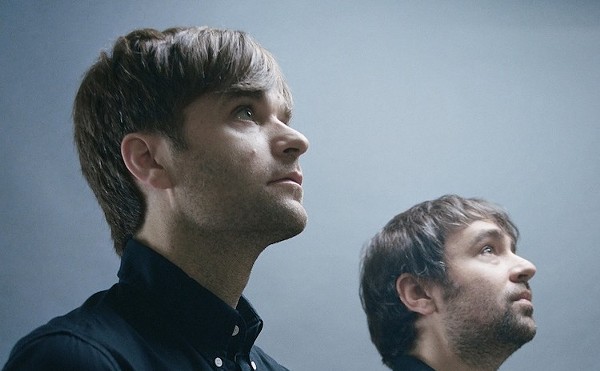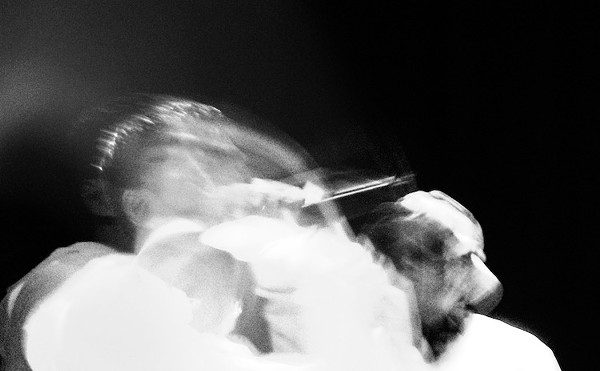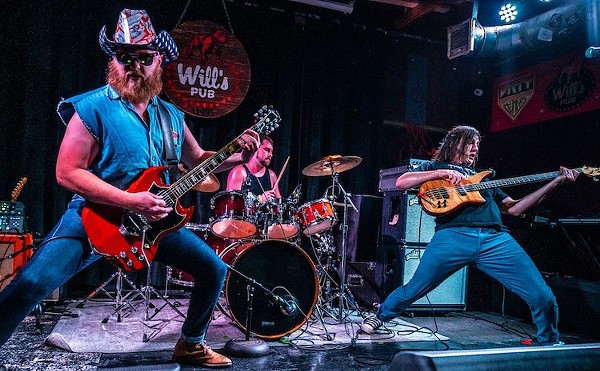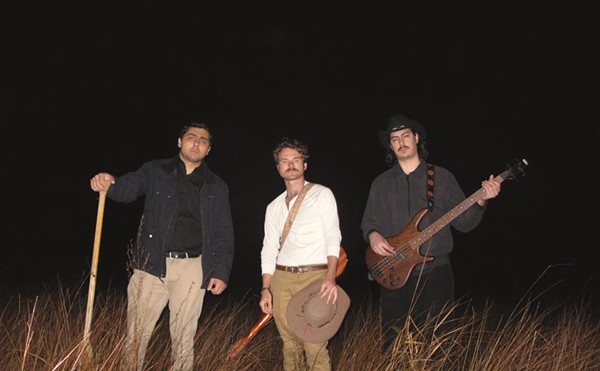Lately it seems as if the well has been running dry on new, exciting music. With few exceptions, much of the clarity and power of R&B, soul and rock have been watered down by the polish of today's recording techniques. There is hope, however, to be found in the unique gospel music that has been incubating itself in the different branches of the Southern Pentecostal House of God churches. Just like peanut butter crashing into chocolate in those old candy commercials, it took a combination of some seemingly unrelated things to create these exhilarating sounds.
The history of this music centers around the popular rise of Hawaiian steel-guitar music during the early half of the last century. Once mainland musicians began to explore the steel guitar, musical seeds were quickly planted outside its Hawaiian roots.
The instrument soon found a home in country tunes, adding a defining element to the music of giants like Jimmie Rodgers, Bob Wills, Roy Acuff and Hank Williams. The mournful and expressive tone of the steel guitar and its offspring, the pedal steel, still remains as one of the only connections between today's country music and its past glory.
Unbeknownst to just about everyone, the steel guitar also had found its way into gospel music during this same period. Since the instrument was so widely available in the 1930s, a young Willie Eason co-opted it and sanctified it by using its fluid sound as a second voice in his call-and-response gospel performances given in revival tents, on street corners and in House of God services.
After moving to Ocala, Fla., in 1940, Eason tutored his youthful brother-in-law, Henry Nelson, who later developed a more fiery and energetic brand of playing that became a counterpoint to Eason's style. These two men are responsible for making the steel guitar the lead instrument in the House of God church; it was an oddity, but it worked, drawing devoted congregations to the impressive music that is still sought out for its reputed power for spiritual healing.
This music remained largely unheard by the world until the disparate musical paths of the Hawaiian steel crossed once again. Robert Stone, who works as a folklorist for the state of Florida, had long been a fan of both Hawaiian and bluegrass music, which often features the dobro, an acoustic version of the steel guitar. In 1992 Stone received a phone call from a music-store owner telling him about black men who were buying steel guitars to play in church. Stone's passion for both the steel guitar and folklore drove him to investigate further.
What Stone found was a revelation: "It was like nothing I had ever heard before. It gave me goose bumps. It changed the way I perceived the steel guitar because it was so African-American." After receiving a grant from the National Endowment for the Arts and the Florida Department of Historical Resources, Stone produced in 1996 the first collection of this music he dubbed "Sacred Steel." It was a 600-cassette copy-pressing featuring only Florida musicians because of the state funding. But it did include both forefathers, Eason and Nelson, as well as younger players like Aubrey Ghent (Nelson's son) and Glenn Lee.
After that first batch of cassettes sold out in a hurry, Sacred Steel caught the attention of Arhoolie Records. The label licensed the recording from the state and made the "Sacred Steel: Traditional Sacred African-American Steel Guitar Music in Florida" (1997) CD available around the world. It soon became one of Arhoolie's most successful releases of the last decade, both critically and commercially. After stories appeared in major publications like Newsweek, it was obvious that Sacred Steel was reaching beyond the normal confines of gospel music. The success of Sacred Steel firmed up a relationship between Arhoolie and Stone that led to three more Sacred Steel releases by individual players. Aubrey Ghent ("Can't Nobody Do Me Like Jesus") and Sonny Treadway ("Jesus Will Fix It!"), who were both on the first compilation, made two of them.
Stone also recorded the first non-Florida act in the series, the Campbell Brothers, who are based out of Rochester, N.Y. The Campbells' notoriety came from their time playing in many House of God churches behind their father, Bishop Charles E. Campbell, an influential church elder.Through their sense of organization and incredible talent, the Campbell Brothers built upon Sacred Steel's momentum. Unlike most of the other players who rarely perform outside of church, the Campbells sought and accepted festival and individual gigs in the U.S. and abroad. Additionally, the Campbells usually augment their performance with great vocalists like Katie Jackson, which enhances the group's versatility and showmanship. Their tight ensemble consists of brothers Chuck, Darick and Phil on pedal steel, lap steel and rhythm guitar; the group has the advantage of a lifetime of fraternal interplay further honed by worldwide touring.
The most recent Sacred Steel album, released in late 1999, best demonstrates all that the Campbells bring to the table. "Sacred Steel Live!" returns to a compilation format that consists mainly of performances from their father's church in Rush, N.Y., and an annual church celebration in Crescent City, Fla. The Campbells lay the rhythmic foundation throughout the disc, appearing as featured artists and as a backing band for other players such as Ted Beard and Calvin Cooke from Michigan, and New Jersey youngster Robert Randolph.
Because Sacred Steel is best heard in a live, improvisational format, the new record might be the best release yet. It has a fervor that shows once and for all how gospel music is the true touchstone for the energy that defines rock & roll. As described in a previous CD review by this writer: "The music sounds like early Allmans backing fiery gospel voices -- a soaring synthesis between band and singer." Its energy commands a listener's attention in a way that is rarely witnessed in the diluted, multitracked mess of most mainstream music.
Now that the Campbell Brothers have shown the way, other Sacred Steel players are anxious to display their wares. Through the foresight of a young House of God member named Marcus Hardy (and the help of eclectic music promoters Civic Minded Five and Rollins College), the first annual Sacred Steel Convention was assembled and will arrive this weekend at the Winter Park college. This convention finally allows a forum outside of church for the various Sacred Steel players from around the country.
The Friday, March 31, portion of the convention will consist of a short history of the genre conducted by Stone, followed by a tribute to Willie Eason and Henry Nelson. The evening ends with a jam session. Saturday, April 1, festivities begin during the day with workshops, leading into showcases for up-and-coming players. The convention concludes that night with a separate-ticket concert by the acknowledged stars of Sacred Steel -- including most all of the performers from the Arhoolie series -- with the Campbell Brothers serving as house band.
In many ways the convention is a new beginning. It offers a history of the music and addresses the state of the art, and serves as a launching pad for the future of the Hawaiian-gospel hybrid, showcasing young talent and what lies ahead.
As Sacred Steel continues to dazzle listeners and fellow musicians -- everyone from Nashville session players to young turks like Derek Trucks are fans -- their sanctified style will likely begin to inform mainstream blues and rock. The Sacred Steel convention gives music lovers -- as well as followers of folklore and African-American traditions -- a rare chance to see and hear something that is reaching out to new ears while staying strong in its roots.
















